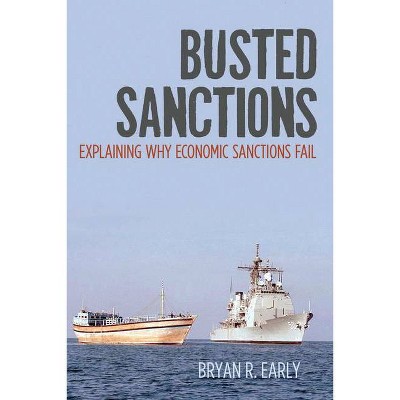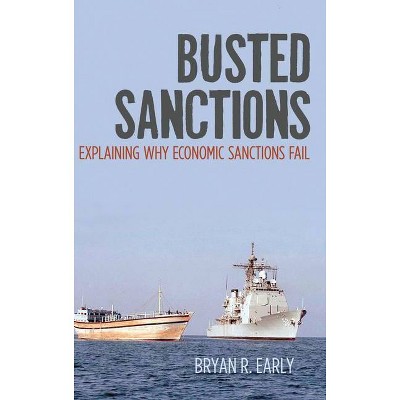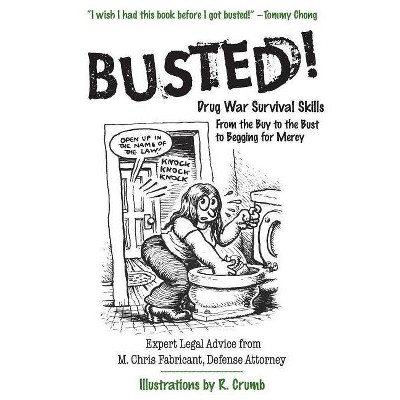Busted Sanctions - by Bryan R Early (Paperback)

Similar Products
Products of same category from the store
AllProduct info
<p/><br></br><p><b> Book Synopsis </b></p></br></br>Powerful countries like the United States regularly employ economic sanctions as a tool for promoting their foreign policy interests. Yet this foreign policy tool has an uninspiring track record of success, with economic sanctions achieving their goals less than a third of the time they are imposed. The costs of these failed sanctions policies can be significant for the states that impose them, their targets, and the other countries they affect. Explaining economic sanctions' high failure rate therefore constitutes a vital endeavor for academics and policy-makers alike. <i>Busted Sanctions</i> seeks to provide this explanation, and reveals that the primary cause of this failure is third-party spoilers, or sanctions busters, who undercut sanctioning efforts by providing their targets with extensive foreign aid or sanctions-busting trade. In quantitatively and qualitatively analyzing over 60 years of U.S. economic sanctions, Bryan Early reveals that both types of third-party sanctions busters have played a major role in undermining U.S. economic sanctions. Surprisingly, his analysis also reveals that the United States' closest allies are often its sanctions' worst enemies. The book offers the first comprehensive explanation for why different types of sanctions busting occur and reveals the devastating effects it has on economic sanctions' chances of success.<p/><br></br><p><b> Review Quotes </b></p></br></br><br>[I]t would be a grave mistake to take this thoughtful, penetrating, and supple book just as an argument against using sanctions as an instrument of foreign policy. It is in fact a primer filled with hard facts and harder lessons from past efforts - and mistakes - designed to show how this process can actually become more effective and productive of the intended result.--Martin Rubin<br><br>[R]ecent history shows that US policy makers often choose to use economic sanctions against adversaries, despite ample evidence pointing to their ineffectiveness. In this book, Early seeks to explain reasons for the frequent and porlonged use of sanctions and to identify the factors limiting their effectiveness . . . Recommended.--E. L. Whalen<br><br>This volume provides a valuable contribution to the literature on economic sanctions and will be of considerable interest to scholars and practitioners in international trade policy, international political economy, and international relations.--Anton D. Lowenberg "<i>Journal of Economic Literature</i>"<br><br>This work is truly novel. Bryan Early is the first scholar to address sanction busting in a rigorous, systematic fashion--by analyzing what motivates states to engage in sanction busting, what measures they use, what the consequences of that busting are and, ultimately, what can be done to counteract them.--A. Cooper Drury, Professor and Chair, Department of Political Science "University of Missouri"<br><br>Understanding the reasons why firms 'bust' sanctions is an important part of discerning why sanctions frequently fail. Backed up by solid empirical modeling and compelling case studies, the research presented in <i>Busted Sanctions</i> goes a long way toward helping us grasp both the causes and consequences of sanction busting.--David Lektzian, Associate Professor of Political Science "Texas Tech University"<br><p/><br></br><p><b> About the Author </b></p></br></br>Bryan R. Early is an Assistant Professor in the Rockefeller College of Public Affairs & Policy at the University at Albany, SUNY and the founding Director of the Project on International Security, Commerce, and Economic Statecraft at the Center for Policy Research.
Price History
Price Archive shows prices from various stores, lets you see history and find the cheapest. There is no actual sale on the website. For all support, inquiry and suggestion messages communication@pricearchive.us




















